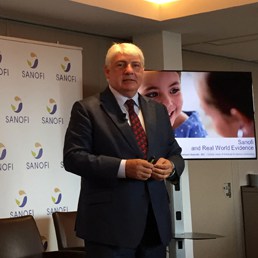
 More books have been written about understanding human behaviour than practically any other subject and they are united in failing to establish universal answers.
More books have been written about understanding human behaviour than practically any other subject and they are united in failing to establish universal answers.
Add layers of medical complexity, societal pressures and fear of the unknown and you have the confounding mysteries and enigmas of understanding patients.
Sir William Osler, one of the founding professors of the acclaimed Johns Hopkins Hospital, is credited with the observation: “The good physician treats the disease; the great physician treats the patient who has the disease.”
That pithy quote from the 19th century has much relevance today and, when fused with modern healthcare data collection, it gains a new potency.
Unlocking the multiple doors to patient behaviour is the bold quest for a new scientific board established by Sanofi, with the goal of improving outcomes and generating business success.
The company has selected eight experts covering social learning, patient activation and economics to staff its behavioural science advisory board under the management of Dr Anne Beal, who is Sanofi’s global head of patient solutions.
The effort is part of the medical evidence generation group, led by Dr Bernard Hamelin, and the aim is to interpret the increasingly detailed streams of medical-grade data generated by the public and healthcare to fashion new models of delivery. It could be a radical departure or a small tweak to an existing programme but Sanofi believes the combination of data and behaviour is pivotal to future care.
Two-way street
Evidence of that is clear by the $10m Sanofi invested earlier this year in Evidation Health, a California-based start-up that specialises in collating and building evidence blocks from behaviour-driven patient data.
“We recognised there was a gap between how medicines performed under ideal conditions in clinical trials and in the real world, so the question became what can we do to improve the performance of our products in the real world?” said Dr Beal. “It became evident that a big element of this is around patient empowerment and supporting them in both self-management and the utilisation of our products.”
The board, with independent experts from Europe and the US, meets three times a year and Sanofi has already benefited from potential patient programme design and challenges to current practice.
“It has become a two-way street and we might have started by saying how do we focus on Sanofi interests but the board is not interested in selling our products; they are interested in improving patient outcomes, so their recommendations are often broader.
“We are learning and discovering along the way. The process gets to the issue of what is the value of our products and our position in the industry. In my opinion, our value should be defined by our ability to improve patient outcomes but I know, as a physician myself, that a significant part is not just the product; it is lifestyle, empowerment, being able to get your questions answered and being able to navigate the healthcare systems. Clearly, as an industry, we cannot play a role in all of that but the more we can support and facilitate that, the better.”
Triggers
Two examples already in their evidence bank show both how simple changes can be and how important behaviour is to outcomes: a group of diabetes patients came up with a series of cue cards to enable them to talk about difficult topics such as alcohol consumption and depression – which are key to their treatment yet often overlooked – with their physicians, and information cards were supplied to doctors that helped them understand the needs of a sector of cardiovascular patients.
“These interventions didn’t necessarily boost our products but they did support the patient,” added Dr Beal.
Dr Hamelin, speaking at a recent seminar on the role of the advisory board in Paris, said: ‘There is a very rapidly changing environment in pharma and this is triggered by the higher cost of healthcare, the increase of people with a number of chronic conditions and the pressure to deliver treatment for these patients. But we also have opportunities because we have greater access to data, medical records, claims data and many other sources of data, and the tools to analyse them.”
Christine Lemke, co-founder and president of Evidation Health, added: “Our platform allows companies to collect and analyse behaviour data in real time and link it to clinical outcomes in order to describe disease onset and progression in whole new ways, as well as therapeutic impact, and to develop digital biomarkers to deliver more proactive care to patients based on their everyday behaviour.
“We are now in an age where the approach has to include behaviour too. If you think about what we used to treat in medicine versus what we have to treat now, which is helping people manage chronic conditions that are largely driven by their behaviours in real life, we need a different data set to build these treatments and cures. We need a different way to understand what is going on today.”
Sanofi believes this enriched data, combined with new analytical tools and platforms, will generate fresh insights from a rich mix of real-world and clinical data, and also help it tailor delivery effectively and react to local and population-specific demands.
Rich data
“The challenges of rising costs in healthcare are shifting the conversations to value – value based on outcome,” said Dr Beal. “Engagement with patients can occur through smartphones and we now have a greater penetration of devices, such as wearables and smartphones, into different populations so we do not get the age, economic or ethnic disparities that were common in data only ten years ago. The data is more evidence-based.
“Our approach comes from the convergence of a number of factors, not least that many of the areas we are working in are chronic conditions that require degrees of self-management, whereas 100 years ago it was an infectious disease world where patient involvement and input was minimal.
“We are aiming to help patients and physicians, and the patient-physician relationship. Behavioural science is not a strong part of medical training, which is largely still grounded in practices around infectious diseases where patient behaviours were just not important to help their condition improve.
“Now, we are now at a stage where the biggest causes of morbidity and mortality are diabetes, obesity, CVD and hypertension and autoimmune conditions which require significant self-management, so we need to catch up with the shift in epidemiology.”
Moving behaviour is fraught with complexity and danger but Sanofi – in keeping with other companies delving into behavioural science for inspiration – is convinced its investment will pay dividends.
“There is a huge opportunity for change because 50% of patient outcomes are a function of behaviour while adherence in chronic conditions is 30-50%. Any possibility of impacting those numbers by supporting patients to manage their conditions is something we have to grasp,” added Dr Beal. “It is positive for society and for the company.
“We know if patients are using our products more and feel more comfortable, so there is a benefit to the business and the bottom line but, frankly, there is also a benefit to our reputation and being seen as a potential partner and resource for helping to improve patient outcomes.”
The digital approach becomes more critical as fewer new medicines get to market and huge therapeutic gains become rarer.
“As a pharma company we are interested in bringing new products and innovations to the market, but if you add the opportunity to maximise the appropriate use of not just our products but others, patients feel empowered and understand the role they can play in preventing the progression of their condition. It’s a huge opportunity,” said Dr Beal.
“One of our core therapy areas is diabetes and we should never see people having amputations or losing their kidneys because of their poor condition management. Whatever role we can play to prevent that is a benefit to the patients and society as much as to ourselves.”




